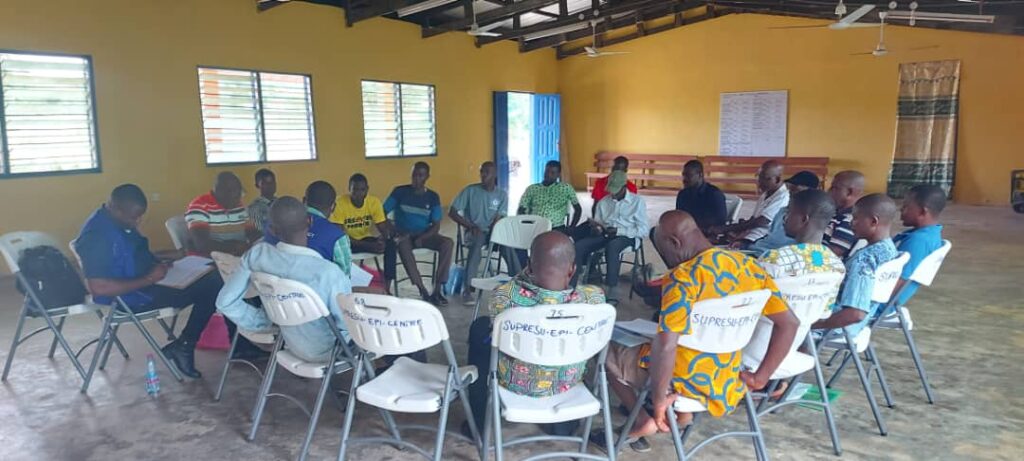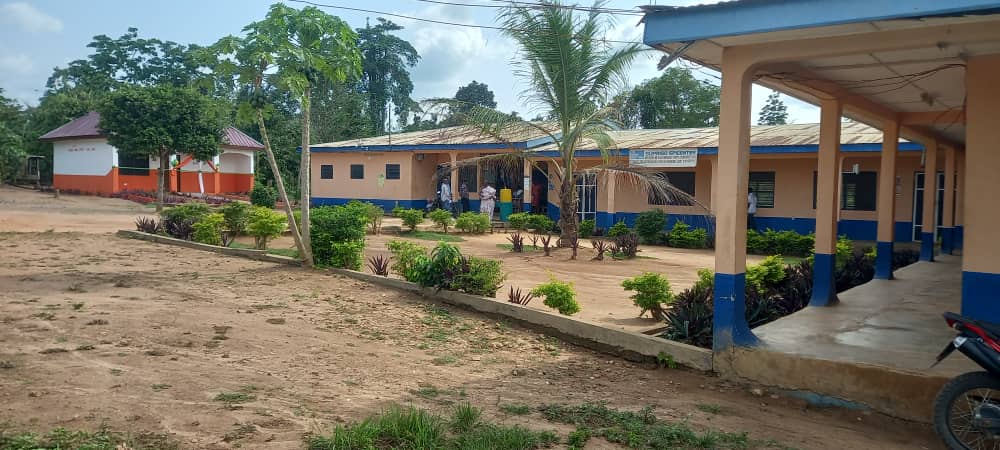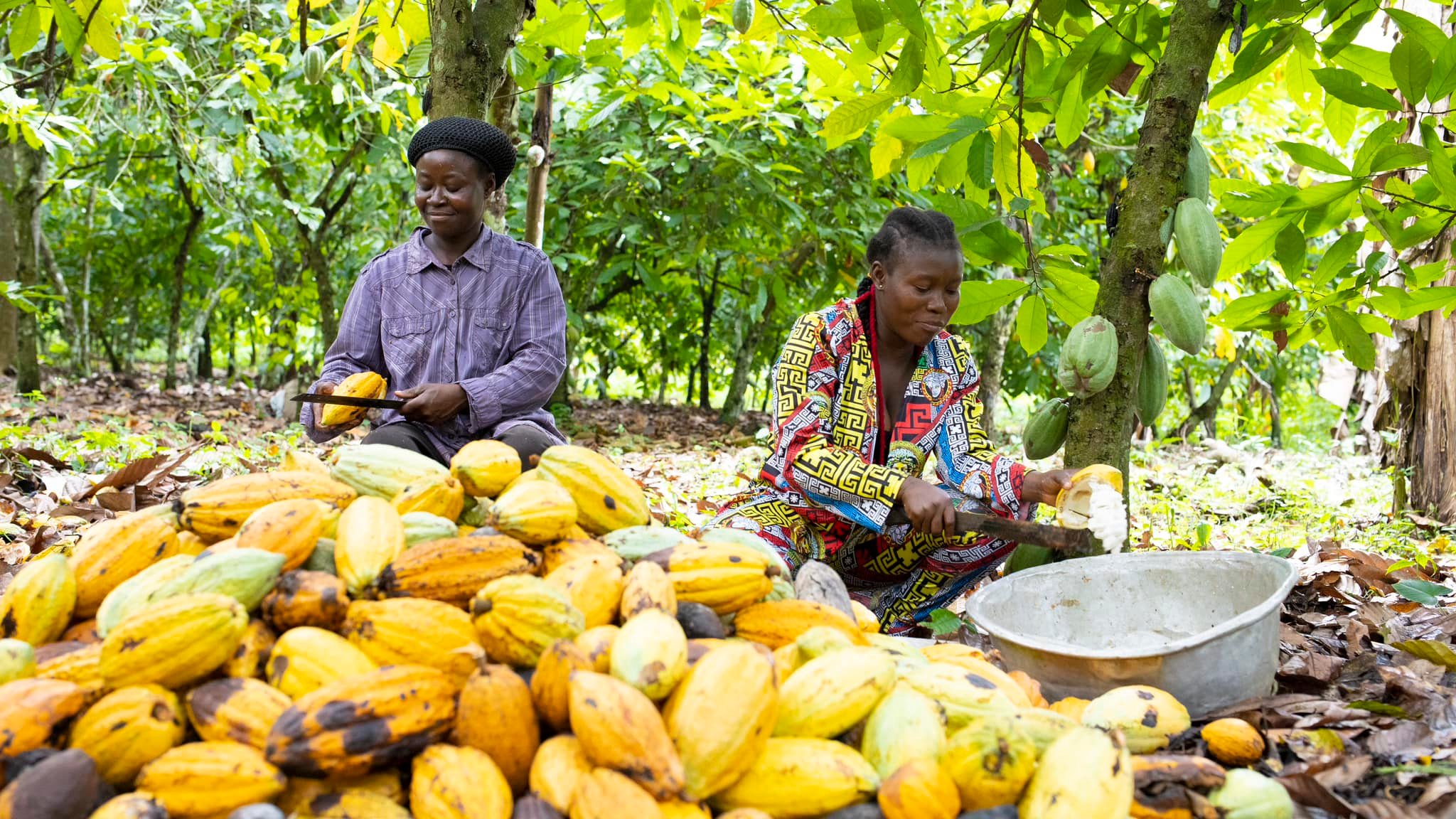In Ghana, nearly half the population, a staggering 12.9 million people, grapple with food insecurity. This isn’t just a rumbling stomach; it hits children especially hard in the north, where chronic hunger can lead to stunted growth. This lack of proper nutrition weakens their immune systems, hinders their cognitive development, and traps them in a cycle of poverty that’s hard to break. It’s a problem that not only hurts individuals but also hinders Ghana’s overall development and economic potential.
But at least one organization is working to reverse that. The Hunger Project or THP, a non-profit, empowers rural communities with the knowledge and tools to improve their food production, processing, and storage, ultimately aiming to break the cycle of hunger. According to the project’s Ghana country manager, Samuel Afrane, “We focus on equipping communities with the skills and resources they need to become self-sufficient.”
THP which operates in 23 countries and nine in Africa, defines hunger as the inability to have a single, balanced meal in a day, ultimately working towards a world where everyone has access to three nutritious meals daily.
From Epicentre to Results
Ghana, one of West Africa’s first countries to gain independence has a huge population dependent on farming-as of 2022, 39.74% of Ghana’s workforce was in Agriculture, with 44% of the country’s female population engaged in agriculture. Most of these individuals fall within the about seven million smallholder farmers that grow 90% of the food the country eats, but many of them struggle to get the tools and knowledge they need to farm better and better their lots.
But since its entry into Ghana in 1995, the Hunger Project using what it refers to as the “epicentre model” supported farming communities to improve their yield and by extension their livelihood. They have reached 450 rural communities in Ghana, serving about 390,000 people, with 2000 volunteers.
The epicenter is both a building, housing different facilities tackling the needs of the communities, and a group of people, who meet, learn, and act as a group to better their lives.
According to Mr. Afrane, the country director They bring clusters of rural communities together, “usually 5 to 10 villages at a time,” he says. They then identify the various social players in these communities, such as farmers, traditional rulers, and social workers.
Within the communities, they train some of the farmers to become extension agents, who then provide training and knowledge to other farmers about improved agricultural practices.

They also support “these communities by establishing agro-input distribution outlets where they can purchase agricultural inputs like fertilizers and chemicals,” Mr. Afrane says. They help them set up demonstration farms to showcase modern agricultural techniques and introduce them to new crops. Farmers can also get access to improved seeds through these outlets and then connect them with off-takers who will buy their produce at fair prices. “This is to encourage them to do more,” Mr. Afrane says.
But the organization doesn’t stop there. “We understand that hunger goes beyond the stomach and can affect even their health,” Afrane states, “We also establish rural clinics to serve the health needs of the farmers and their families. We encourage improved social practices in their homes, especially in supporting their children’s education,” he says.
In addition, THP also trains and supports the farmers with access to finance through a savings and microloans schemes. “Most of these farmers in rural communities are cut off from formal financial institutions.”
But none of these is a handout, Afrane insists, “The goal is for the community to become self-sufficient, running the epicenter on their own.”
Learn and teach others
One evening at home in Supres0, in the Eastern Region of Ghana, Ms. Jessica Afful heard the community announcer calling a meeting about the Supresso epicenter. Curious, she inquired further and learned it was open for everyone to attend.
“At the meeting,” Ms. Afful recalled, “the supervisors explained the concept of the epicenter and the opportunities it offered. We could learn about sanitation, maternal health, and even nutrition.”
Ms. Afful’s dedication was recognized, and she was later selected as an “animator” – a local leader trained by THP to train other community members. For her, the project’s benefits went far beyond that.
“As a young mother of twins, I knew little about maternal care,” she shared. ” I learned about maternal health, how to care for myself and my children, and how to properly nourish them.”

The impact extended beyond knowledge. “The Hunger Project has given me self-confidence,” Ms. Afful stated. “I used to struggle to express myself, but now I can train others. Before, I passively waited for things to happen. Now, I’m actively working to improve myself and my family.”
According to Mr. Afrane, the impact has been significant. 23 of the 45 epicenters have already achieved self-reliance, a testament to the program’s success.
Mr. Afrane elaborated on the tangible results. “Poverty rates in these communities have dropped dramatically, from a range of 20% to 45% down to between 6% and 9%.” He continued, highlighting improvements in health outcomes as well. “Maternal mortality rates have also decreased significantly, from over 30% to less than 5%. Child stunting, a measure of malnutrition, has also been reduced to less than 10% among children in our epicenters, compared to the national average of 18%.”
Despite progress, THP still faces challenges. One major hurdle the project encountered in some communities was child marriage, which Mr. Afrane identifies as a cause of generational poverty. “Before you can reduce hunger and poverty,” he explains, “you’ve got to fight against this practice.” Breaking this deeply ingrained tradition is no easy feat. However, Mr. Afrane highlights their success: “Through discussions with community leaders, we’ve been able to significantly reduce child marriage rates and keep girls in school.”
Another challenge involves loan repayment. “We knew forced repayment wouldn’t work,” Mr. Afrane says. Instead, THP leverages the power of social dynamics and community support. In rural areas, public shaming carries a strong social stigma, which motivates repayment.
“The Hunger Project built an epicenter in our community,” Ms. Afful from Suppresso explains. “It’s a central building housing a health facility, a microfinance institution, a conference center, a social enterprise, and even a computer lab. Before the epicenter, mothers, including myself, had to travel long distances for prenatal and postnatal care. Now, it’s readily available.”
“I’m excited to be a part of this program, ” Afful continues. “I’ve learned so much and can now share this knowledge with others. It brings me joy to help them avoid the challenges I faced.”
Nearly half of Ghana's population, about 12.9 million people, face food insecurity, significantly impacting children's health and development. The Hunger Project (THP), a non-profit organization, is working to alleviate this by empowering rural communities in Ghana. They focus on improving agricultural practices through training and providing necessary tools and resources to foster self-sufficiency.
THP operates using an “epicenter model” involving a central facility and community collaboration. Since 1995, the initiative has reached 450 rural communities, benefiting around 390,000 people. The epicenters address various community needs, including agriculture, health, education, and access to finance.
A significant part of THP's success lies in training farmers to become extension agents who then disseminate knowledge on advanced farming techniques. They also establish agro-input outlets and demonstration farms to introduce modern practices and crop varieties, as well as connect farmers with fair-market buyers. Besides agriculture, THP provides healthcare facilities and supports financial independence through microloans and savings schemes.
Real-life success stories, like that of Jessica Afful, highlight the positive impact of THP. Afful, who became a trained animator, benefited from maternal health education and gained the confidence to help others in her community. THP's efforts have notably reduced poverty and malnutrition, with many communities achieving self-reliance.
The organization continues to face challenges like combating child marriage and ensuring loan repayments. However, their community engagement strategy has seen successes in reducing child marriages and motivating financial responsibility through social pressures.






